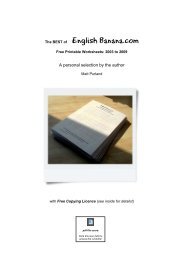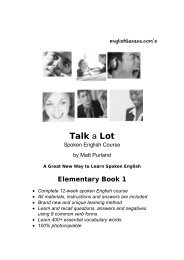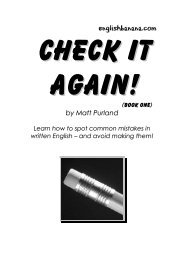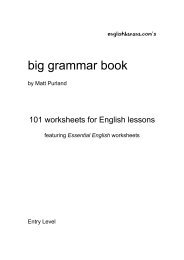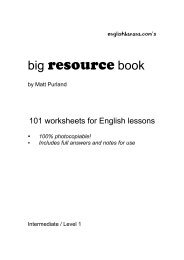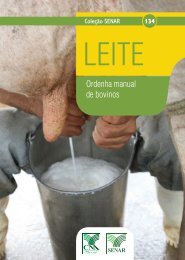activiTy
Create successful ePaper yourself
Turn your PDF publications into a flip-book with our unique Google optimized e-Paper software.
English Banana.com<br />
Games for the Classroom<br />
“What time is ‘The A-Team’ on?”, and “What time does ‘The A-Team’ finish?”, before moving<br />
on to more complex reading comprehension questions such as, “What is the name of the<br />
actor who plays ‘Mr.T’ in ‘The A-Team’?” Get the students to nominate a ‘runner’ from their<br />
team who runs and writes the answers on the board. You can even get them drawing clock<br />
faces as an answer, or writing the answer using the twenty four hour clock. Note: questions<br />
need not be ‘A-Team’-based!<br />
Board Game Boffins<br />
As a project, get the students working in pairs or small groups to design a new board game.<br />
They have to form a games ‘company’, and then plan the concept and design of their game.<br />
After that they have to actually make a working prototype, which they test out, and which is<br />
then tested along with all the other ideas in a games tournament. Each company has to<br />
explain the reasons behind the design choices that they made in constructing their game. The<br />
students then all vote for their favourite games in categories such as: ‘Most playable game’,<br />
‘Game most likely to make a $million’, ‘Best design and construction’, and so on. You could<br />
use the board game template on page 73 as a starting point.<br />
Ten Things<br />
Get your students to leave the building and go out in small groups or pairs with the task of<br />
writing down ‘Ten things you can see at...’ various places near to your school or college. For<br />
example, they could write down ten things you can see at... the leisure centre, the shopping<br />
centre, the sports stadium, the post office, the doctor’s, the bus station, the railway station,<br />
the market, the funfair, and so on. Ask them to make sure that their spellings are correct<br />
before coming back to you with their list(s). Of course you could always make it ‘Fifty things<br />
you can see at...’ if your group are particularly gifted – or if you just want to get rid of them for<br />
the whole morning...! When they come back, discuss together what each group has found.<br />
What Shops Sell What...?<br />
This is a similar exercise to ‘Ten Things’, in that the students leave the classroom in pairs or<br />
small groups and go around town for a couple of hours. They have to write down the proper<br />
names of as many shops as they can, along with a brief description of what you can buy at<br />
that shop. For example, ‘Marks and Spencer – clothes and food’, ‘Debenhams – clothes, gifts,<br />
and perfume’, until they have a list of around twenty shops. When the students get back they<br />
could write sentences about the shops, for example, ‘At Marks and Spencer you can buy<br />
clothes and food.’ It motivates students to go into and look around shops that they may walk<br />
past every day but have never visited. You could always set the list of shops for your students<br />
to visit, ensuring a variety of types. Of course, it gives an opportunity to practise shopping<br />
vocab wherever you happen to be teaching.<br />
Vocabulary Building<br />
Name And Explain<br />
This is a good game for practising spelling classroom words and getting students to talk about<br />
their immediate environment. Split the class into two groups and give each group a pack of<br />
sticky labels. Their task is to write labels and stick them on twenty different things in the<br />
classroom. Spellings must be correct, and at the end of the game students must give you a<br />
For more fun worksheets, games and quizzes log onto www.englishbanana.com now!<br />
big activity book © English Banana 2004 89.




